Public Health Interview Report: Dr. Ramon Shaban, Infectious Diseases
VerifiedAdded on 2022/11/26
|9
|2035
|434
Report
AI Summary
This report presents a qualitative data analysis of an interview with Dr. Ramon Shaban, a professor at the University of Sydney specializing in infection prevention and control. The methodology involved a semi-structured interview to gather insights into his career, research interests, and perspectives on infectious diseases. The report details the interview process, including the questions asked and Dr. Shaban's responses, which were analyzed using a phenomenological approach to identify key themes. The generated themes include academic motivation for research, evidence of infection control programs, and approaches to infection control. The report also includes biographical details of Dr. Shaban, his current role, career trajectory, and advice for future public health professionals. The reflection section provides a critical evaluation of the interview process, highlighting the interviewer's learning experiences, challenges, and areas for improvement. The report emphasizes Dr. Shaban's expertise in the field and his contributions to the understanding and management of infectious diseases, based on the interview transcript and data analysis, with references to the sources used.
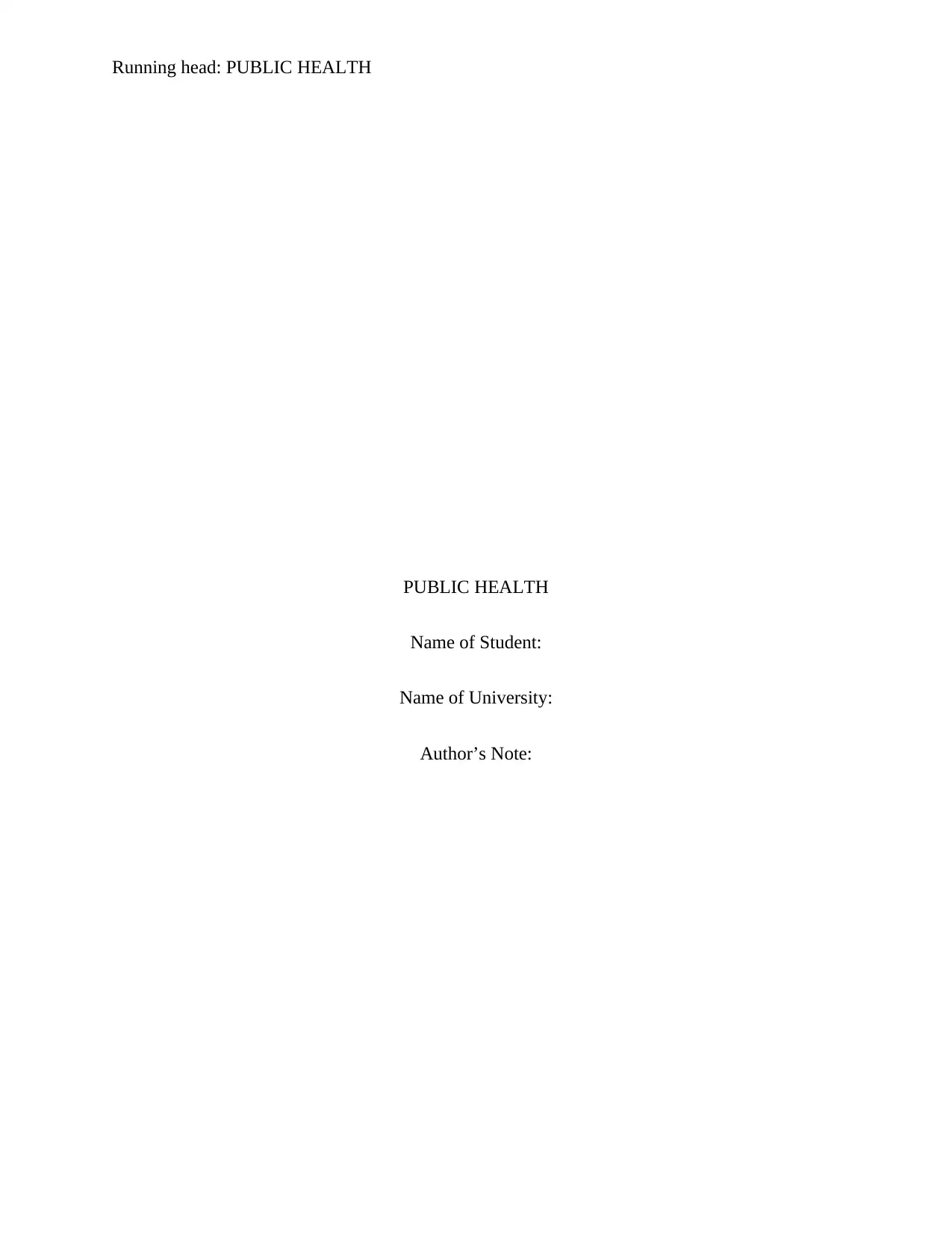
Running head: PUBLIC HEALTH
PUBLIC HEALTH
Name of Student:
Name of University:
Author’s Note:
PUBLIC HEALTH
Name of Student:
Name of University:
Author’s Note:
Paraphrase This Document
Need a fresh take? Get an instant paraphrase of this document with our AI Paraphraser
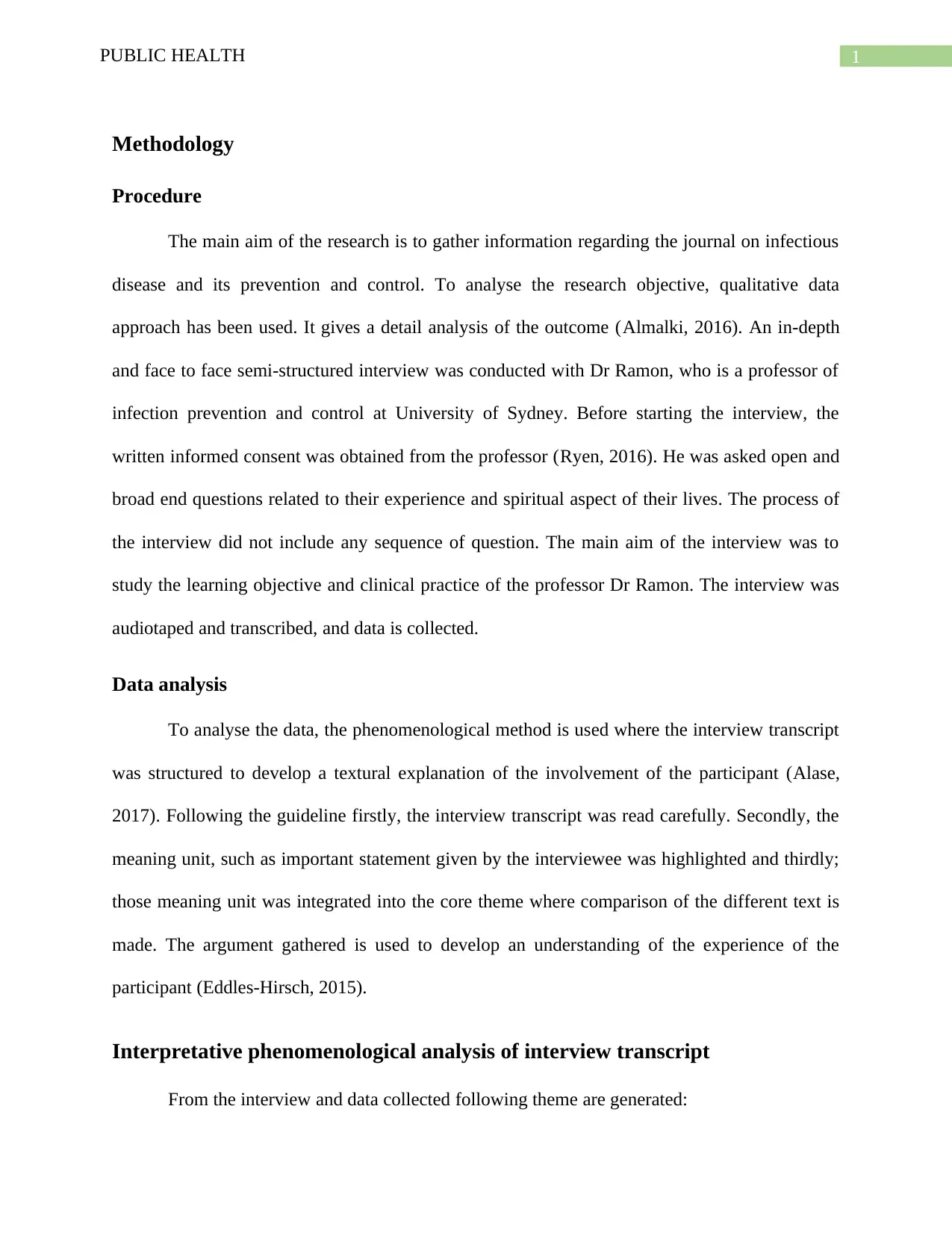
1PUBLIC HEALTH
Methodology
Procedure
The main aim of the research is to gather information regarding the journal on infectious
disease and its prevention and control. To analyse the research objective, qualitative data
approach has been used. It gives a detail analysis of the outcome (Almalki, 2016). An in-depth
and face to face semi-structured interview was conducted with Dr Ramon, who is a professor of
infection prevention and control at University of Sydney. Before starting the interview, the
written informed consent was obtained from the professor (Ryen, 2016). He was asked open and
broad end questions related to their experience and spiritual aspect of their lives. The process of
the interview did not include any sequence of question. The main aim of the interview was to
study the learning objective and clinical practice of the professor Dr Ramon. The interview was
audiotaped and transcribed, and data is collected.
Data analysis
To analyse the data, the phenomenological method is used where the interview transcript
was structured to develop a textural explanation of the involvement of the participant (Alase,
2017). Following the guideline firstly, the interview transcript was read carefully. Secondly, the
meaning unit, such as important statement given by the interviewee was highlighted and thirdly;
those meaning unit was integrated into the core theme where comparison of the different text is
made. The argument gathered is used to develop an understanding of the experience of the
participant (Eddles-Hirsch, 2015).
Interpretative phenomenological analysis of interview transcript
From the interview and data collected following theme are generated:
Methodology
Procedure
The main aim of the research is to gather information regarding the journal on infectious
disease and its prevention and control. To analyse the research objective, qualitative data
approach has been used. It gives a detail analysis of the outcome (Almalki, 2016). An in-depth
and face to face semi-structured interview was conducted with Dr Ramon, who is a professor of
infection prevention and control at University of Sydney. Before starting the interview, the
written informed consent was obtained from the professor (Ryen, 2016). He was asked open and
broad end questions related to their experience and spiritual aspect of their lives. The process of
the interview did not include any sequence of question. The main aim of the interview was to
study the learning objective and clinical practice of the professor Dr Ramon. The interview was
audiotaped and transcribed, and data is collected.
Data analysis
To analyse the data, the phenomenological method is used where the interview transcript
was structured to develop a textural explanation of the involvement of the participant (Alase,
2017). Following the guideline firstly, the interview transcript was read carefully. Secondly, the
meaning unit, such as important statement given by the interviewee was highlighted and thirdly;
those meaning unit was integrated into the core theme where comparison of the different text is
made. The argument gathered is used to develop an understanding of the experience of the
participant (Eddles-Hirsch, 2015).
Interpretative phenomenological analysis of interview transcript
From the interview and data collected following theme are generated:
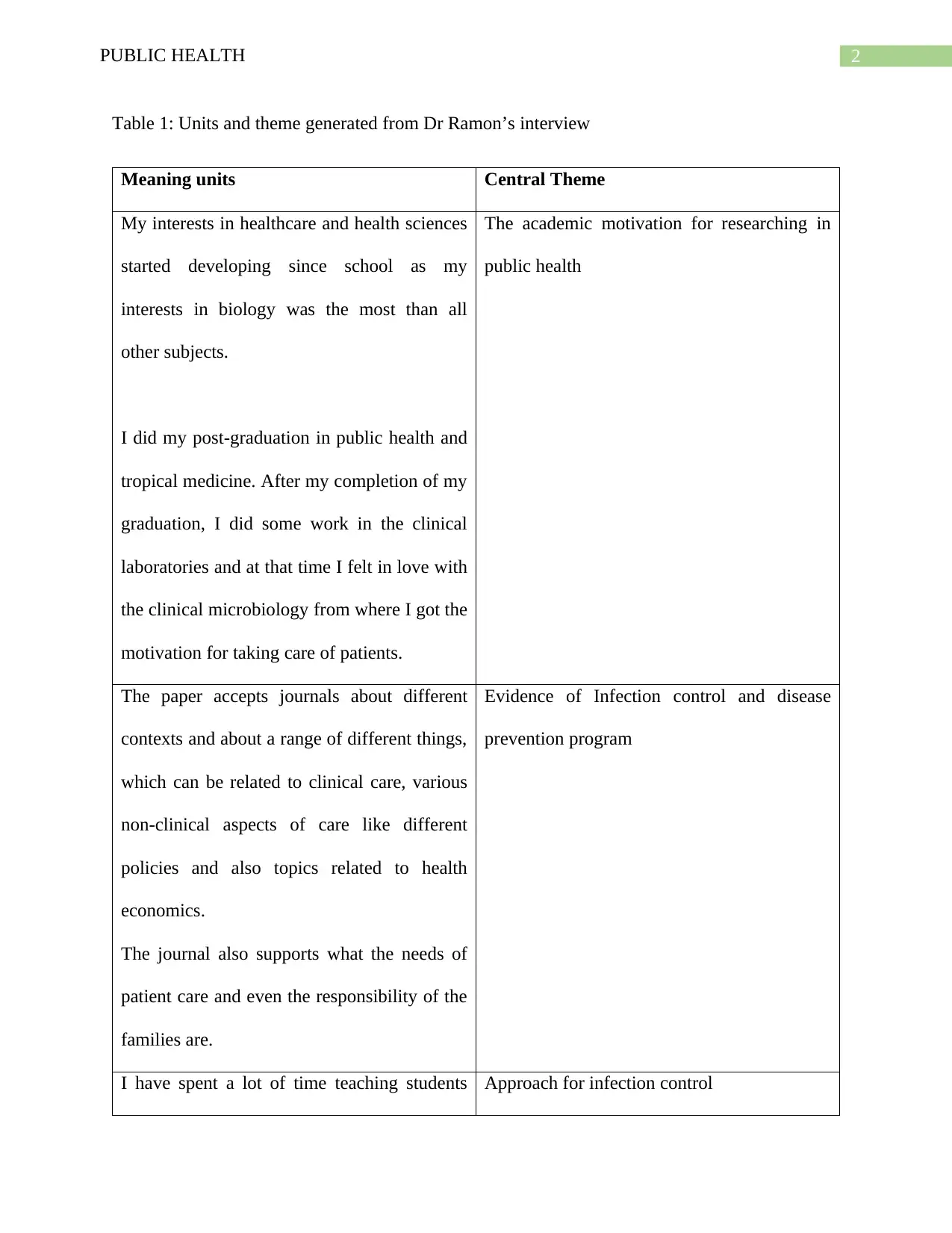
2PUBLIC HEALTH
Table 1: Units and theme generated from Dr Ramon’s interview
Meaning units Central Theme
My interests in healthcare and health sciences
started developing since school as my
interests in biology was the most than all
other subjects.
I did my post-graduation in public health and
tropical medicine. After my completion of my
graduation, I did some work in the clinical
laboratories and at that time I felt in love with
the clinical microbiology from where I got the
motivation for taking care of patients.
The academic motivation for researching in
public health
The paper accepts journals about different
contexts and about a range of different things,
which can be related to clinical care, various
non-clinical aspects of care like different
policies and also topics related to health
economics.
The journal also supports what the needs of
patient care and even the responsibility of the
families are.
Evidence of Infection control and disease
prevention program
I have spent a lot of time teaching students Approach for infection control
Table 1: Units and theme generated from Dr Ramon’s interview
Meaning units Central Theme
My interests in healthcare and health sciences
started developing since school as my
interests in biology was the most than all
other subjects.
I did my post-graduation in public health and
tropical medicine. After my completion of my
graduation, I did some work in the clinical
laboratories and at that time I felt in love with
the clinical microbiology from where I got the
motivation for taking care of patients.
The academic motivation for researching in
public health
The paper accepts journals about different
contexts and about a range of different things,
which can be related to clinical care, various
non-clinical aspects of care like different
policies and also topics related to health
economics.
The journal also supports what the needs of
patient care and even the responsibility of the
families are.
Evidence of Infection control and disease
prevention program
I have spent a lot of time teaching students Approach for infection control
⊘ This is a preview!⊘
Do you want full access?
Subscribe today to unlock all pages.

Trusted by 1+ million students worldwide
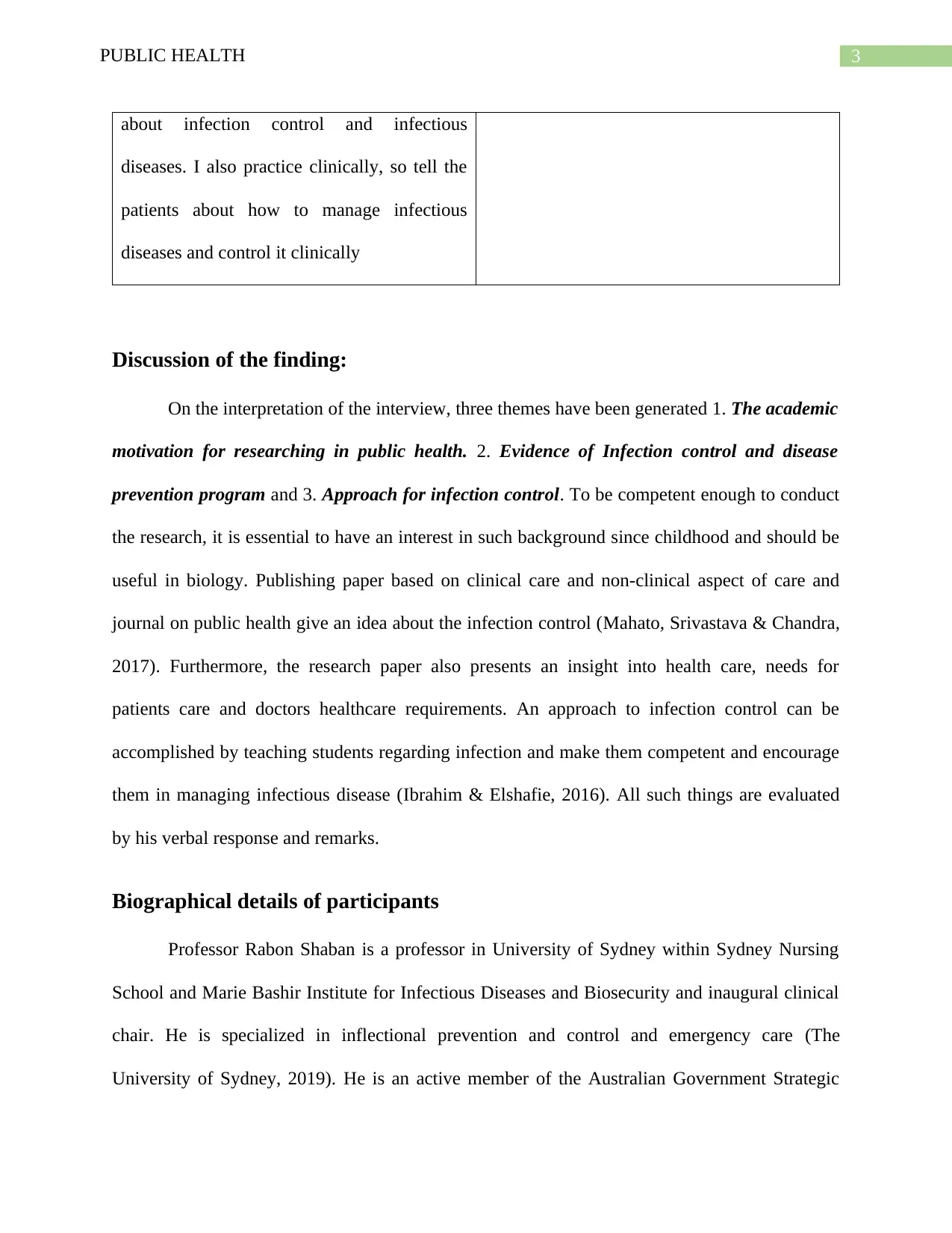
3PUBLIC HEALTH
about infection control and infectious
diseases. I also practice clinically, so tell the
patients about how to manage infectious
diseases and control it clinically
Discussion of the finding:
On the interpretation of the interview, three themes have been generated 1. The academic
motivation for researching in public health. 2. Evidence of Infection control and disease
prevention program and 3. Approach for infection control. To be competent enough to conduct
the research, it is essential to have an interest in such background since childhood and should be
useful in biology. Publishing paper based on clinical care and non-clinical aspect of care and
journal on public health give an idea about the infection control (Mahato, Srivastava & Chandra,
2017). Furthermore, the research paper also presents an insight into health care, needs for
patients care and doctors healthcare requirements. An approach to infection control can be
accomplished by teaching students regarding infection and make them competent and encourage
them in managing infectious disease (Ibrahim & Elshafie, 2016). All such things are evaluated
by his verbal response and remarks.
Biographical details of participants
Professor Rabon Shaban is a professor in University of Sydney within Sydney Nursing
School and Marie Bashir Institute for Infectious Diseases and Biosecurity and inaugural clinical
chair. He is specialized in inflectional prevention and control and emergency care (The
University of Sydney, 2019). He is an active member of the Australian Government Strategic
about infection control and infectious
diseases. I also practice clinically, so tell the
patients about how to manage infectious
diseases and control it clinically
Discussion of the finding:
On the interpretation of the interview, three themes have been generated 1. The academic
motivation for researching in public health. 2. Evidence of Infection control and disease
prevention program and 3. Approach for infection control. To be competent enough to conduct
the research, it is essential to have an interest in such background since childhood and should be
useful in biology. Publishing paper based on clinical care and non-clinical aspect of care and
journal on public health give an idea about the infection control (Mahato, Srivastava & Chandra,
2017). Furthermore, the research paper also presents an insight into health care, needs for
patients care and doctors healthcare requirements. An approach to infection control can be
accomplished by teaching students regarding infection and make them competent and encourage
them in managing infectious disease (Ibrahim & Elshafie, 2016). All such things are evaluated
by his verbal response and remarks.
Biographical details of participants
Professor Rabon Shaban is a professor in University of Sydney within Sydney Nursing
School and Marie Bashir Institute for Infectious Diseases and Biosecurity and inaugural clinical
chair. He is specialized in inflectional prevention and control and emergency care (The
University of Sydney, 2019). He is an active member of the Australian Government Strategic
Paraphrase This Document
Need a fresh take? Get an instant paraphrase of this document with our AI Paraphraser
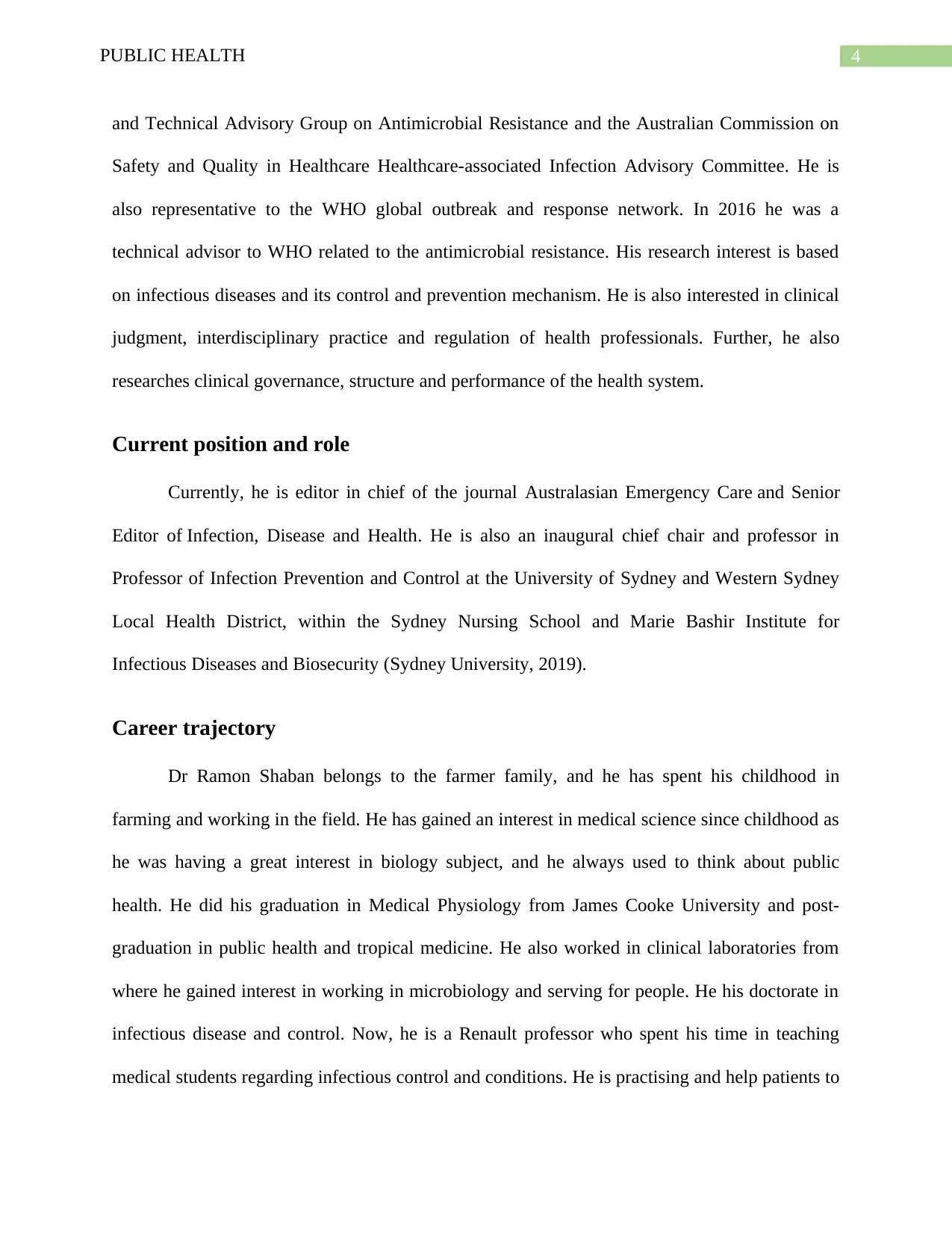
4PUBLIC HEALTH
and Technical Advisory Group on Antimicrobial Resistance and the Australian Commission on
Safety and Quality in Healthcare Healthcare-associated Infection Advisory Committee. He is
also representative to the WHO global outbreak and response network. In 2016 he was a
technical advisor to WHO related to the antimicrobial resistance. His research interest is based
on infectious diseases and its control and prevention mechanism. He is also interested in clinical
judgment, interdisciplinary practice and regulation of health professionals. Further, he also
researches clinical governance, structure and performance of the health system.
Current position and role
Currently, he is editor in chief of the journal Australasian Emergency Care and Senior
Editor of Infection, Disease and Health. He is also an inaugural chief chair and professor in
Professor of Infection Prevention and Control at the University of Sydney and Western Sydney
Local Health District, within the Sydney Nursing School and Marie Bashir Institute for
Infectious Diseases and Biosecurity (Sydney University, 2019).
Career trajectory
Dr Ramon Shaban belongs to the farmer family, and he has spent his childhood in
farming and working in the field. He has gained an interest in medical science since childhood as
he was having a great interest in biology subject, and he always used to think about public
health. He did his graduation in Medical Physiology from James Cooke University and post-
graduation in public health and tropical medicine. He also worked in clinical laboratories from
where he gained interest in working in microbiology and serving for people. He his doctorate in
infectious disease and control. Now, he is a Renault professor who spent his time in teaching
medical students regarding infectious control and conditions. He is practising and help patients to
and Technical Advisory Group on Antimicrobial Resistance and the Australian Commission on
Safety and Quality in Healthcare Healthcare-associated Infection Advisory Committee. He is
also representative to the WHO global outbreak and response network. In 2016 he was a
technical advisor to WHO related to the antimicrobial resistance. His research interest is based
on infectious diseases and its control and prevention mechanism. He is also interested in clinical
judgment, interdisciplinary practice and regulation of health professionals. Further, he also
researches clinical governance, structure and performance of the health system.
Current position and role
Currently, he is editor in chief of the journal Australasian Emergency Care and Senior
Editor of Infection, Disease and Health. He is also an inaugural chief chair and professor in
Professor of Infection Prevention and Control at the University of Sydney and Western Sydney
Local Health District, within the Sydney Nursing School and Marie Bashir Institute for
Infectious Diseases and Biosecurity (Sydney University, 2019).
Career trajectory
Dr Ramon Shaban belongs to the farmer family, and he has spent his childhood in
farming and working in the field. He has gained an interest in medical science since childhood as
he was having a great interest in biology subject, and he always used to think about public
health. He did his graduation in Medical Physiology from James Cooke University and post-
graduation in public health and tropical medicine. He also worked in clinical laboratories from
where he gained interest in working in microbiology and serving for people. He his doctorate in
infectious disease and control. Now, he is a Renault professor who spent his time in teaching
medical students regarding infectious control and conditions. He is practising and help patients to
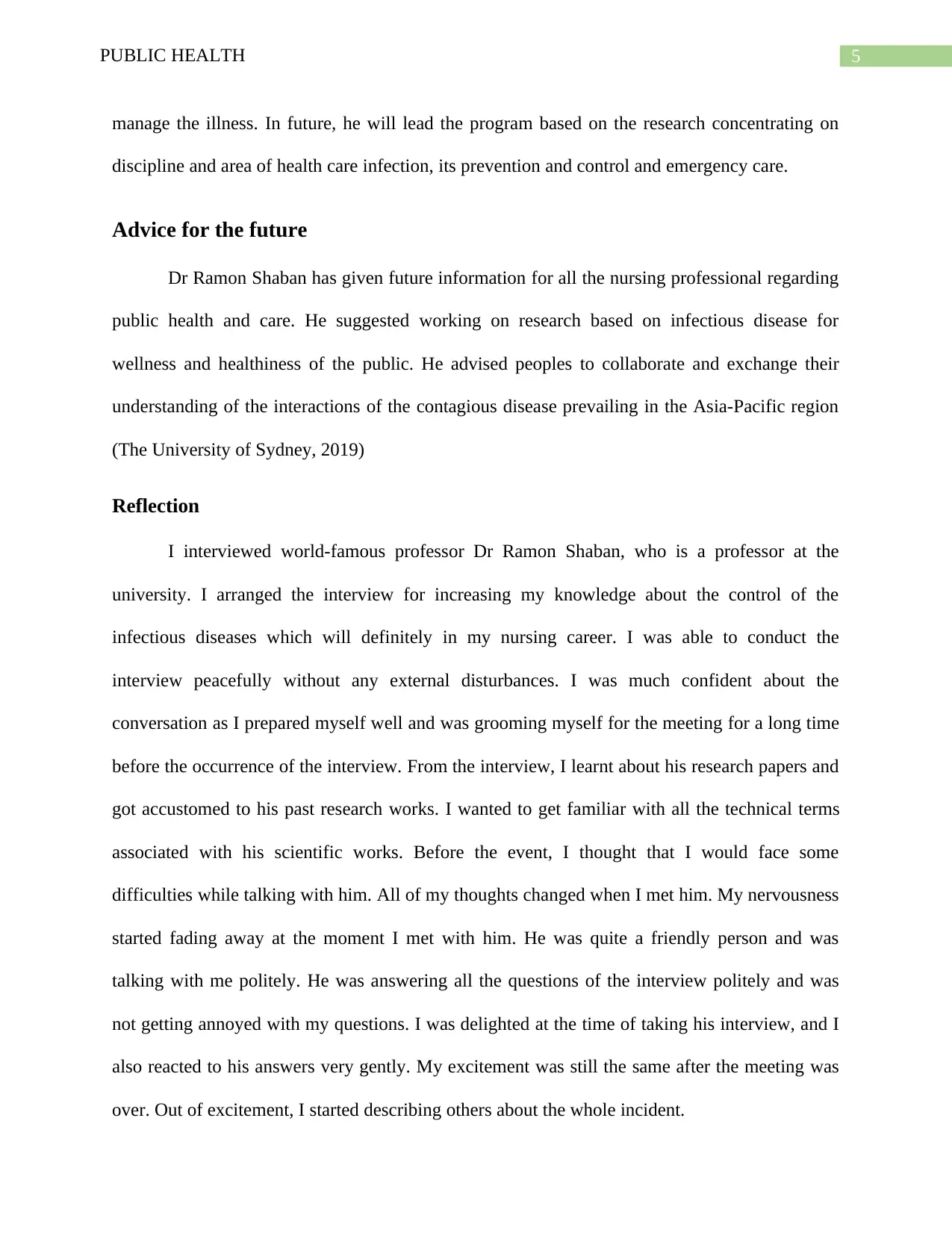
5PUBLIC HEALTH
manage the illness. In future, he will lead the program based on the research concentrating on
discipline and area of health care infection, its prevention and control and emergency care.
Advice for the future
Dr Ramon Shaban has given future information for all the nursing professional regarding
public health and care. He suggested working on research based on infectious disease for
wellness and healthiness of the public. He advised peoples to collaborate and exchange their
understanding of the interactions of the contagious disease prevailing in the Asia-Pacific region
(The University of Sydney, 2019)
Reflection
I interviewed world-famous professor Dr Ramon Shaban, who is a professor at the
university. I arranged the interview for increasing my knowledge about the control of the
infectious diseases which will definitely in my nursing career. I was able to conduct the
interview peacefully without any external disturbances. I was much confident about the
conversation as I prepared myself well and was grooming myself for the meeting for a long time
before the occurrence of the interview. From the interview, I learnt about his research papers and
got accustomed to his past research works. I wanted to get familiar with all the technical terms
associated with his scientific works. Before the event, I thought that I would face some
difficulties while talking with him. All of my thoughts changed when I met him. My nervousness
started fading away at the moment I met with him. He was quite a friendly person and was
talking with me politely. He was answering all the questions of the interview politely and was
not getting annoyed with my questions. I was delighted at the time of taking his interview, and I
also reacted to his answers very gently. My excitement was still the same after the meeting was
over. Out of excitement, I started describing others about the whole incident.
manage the illness. In future, he will lead the program based on the research concentrating on
discipline and area of health care infection, its prevention and control and emergency care.
Advice for the future
Dr Ramon Shaban has given future information for all the nursing professional regarding
public health and care. He suggested working on research based on infectious disease for
wellness and healthiness of the public. He advised peoples to collaborate and exchange their
understanding of the interactions of the contagious disease prevailing in the Asia-Pacific region
(The University of Sydney, 2019)
Reflection
I interviewed world-famous professor Dr Ramon Shaban, who is a professor at the
university. I arranged the interview for increasing my knowledge about the control of the
infectious diseases which will definitely in my nursing career. I was able to conduct the
interview peacefully without any external disturbances. I was much confident about the
conversation as I prepared myself well and was grooming myself for the meeting for a long time
before the occurrence of the interview. From the interview, I learnt about his research papers and
got accustomed to his past research works. I wanted to get familiar with all the technical terms
associated with his scientific works. Before the event, I thought that I would face some
difficulties while talking with him. All of my thoughts changed when I met him. My nervousness
started fading away at the moment I met with him. He was quite a friendly person and was
talking with me politely. He was answering all the questions of the interview politely and was
not getting annoyed with my questions. I was delighted at the time of taking his interview, and I
also reacted to his answers very gently. My excitement was still the same after the meeting was
over. Out of excitement, I started describing others about the whole incident.
⊘ This is a preview!⊘
Do you want full access?
Subscribe today to unlock all pages.

Trusted by 1+ million students worldwide
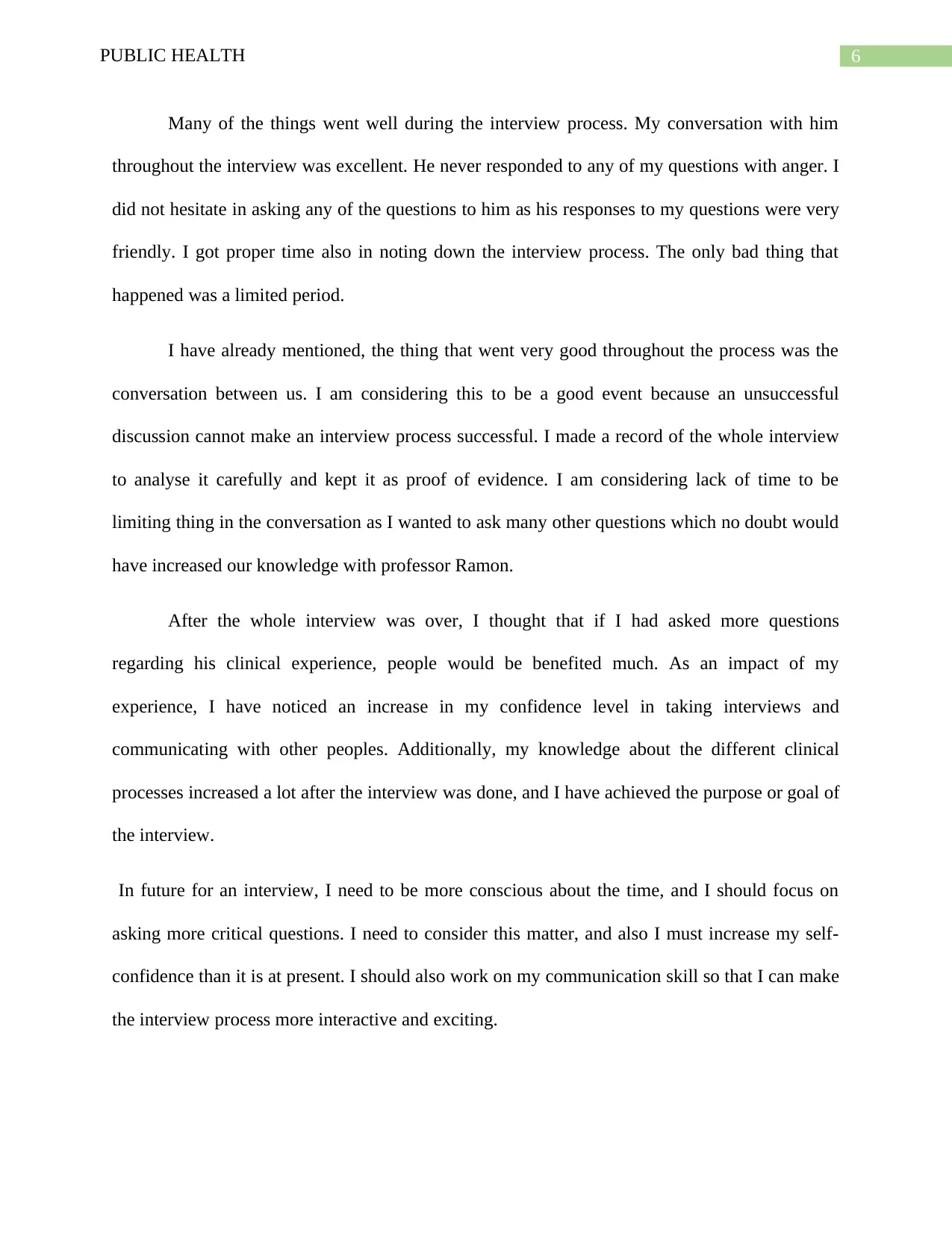
6PUBLIC HEALTH
Many of the things went well during the interview process. My conversation with him
throughout the interview was excellent. He never responded to any of my questions with anger. I
did not hesitate in asking any of the questions to him as his responses to my questions were very
friendly. I got proper time also in noting down the interview process. The only bad thing that
happened was a limited period.
I have already mentioned, the thing that went very good throughout the process was the
conversation between us. I am considering this to be a good event because an unsuccessful
discussion cannot make an interview process successful. I made a record of the whole interview
to analyse it carefully and kept it as proof of evidence. I am considering lack of time to be
limiting thing in the conversation as I wanted to ask many other questions which no doubt would
have increased our knowledge with professor Ramon.
After the whole interview was over, I thought that if I had asked more questions
regarding his clinical experience, people would be benefited much. As an impact of my
experience, I have noticed an increase in my confidence level in taking interviews and
communicating with other peoples. Additionally, my knowledge about the different clinical
processes increased a lot after the interview was done, and I have achieved the purpose or goal of
the interview.
In future for an interview, I need to be more conscious about the time, and I should focus on
asking more critical questions. I need to consider this matter, and also I must increase my self-
confidence than it is at present. I should also work on my communication skill so that I can make
the interview process more interactive and exciting.
Many of the things went well during the interview process. My conversation with him
throughout the interview was excellent. He never responded to any of my questions with anger. I
did not hesitate in asking any of the questions to him as his responses to my questions were very
friendly. I got proper time also in noting down the interview process. The only bad thing that
happened was a limited period.
I have already mentioned, the thing that went very good throughout the process was the
conversation between us. I am considering this to be a good event because an unsuccessful
discussion cannot make an interview process successful. I made a record of the whole interview
to analyse it carefully and kept it as proof of evidence. I am considering lack of time to be
limiting thing in the conversation as I wanted to ask many other questions which no doubt would
have increased our knowledge with professor Ramon.
After the whole interview was over, I thought that if I had asked more questions
regarding his clinical experience, people would be benefited much. As an impact of my
experience, I have noticed an increase in my confidence level in taking interviews and
communicating with other peoples. Additionally, my knowledge about the different clinical
processes increased a lot after the interview was done, and I have achieved the purpose or goal of
the interview.
In future for an interview, I need to be more conscious about the time, and I should focus on
asking more critical questions. I need to consider this matter, and also I must increase my self-
confidence than it is at present. I should also work on my communication skill so that I can make
the interview process more interactive and exciting.
Paraphrase This Document
Need a fresh take? Get an instant paraphrase of this document with our AI Paraphraser
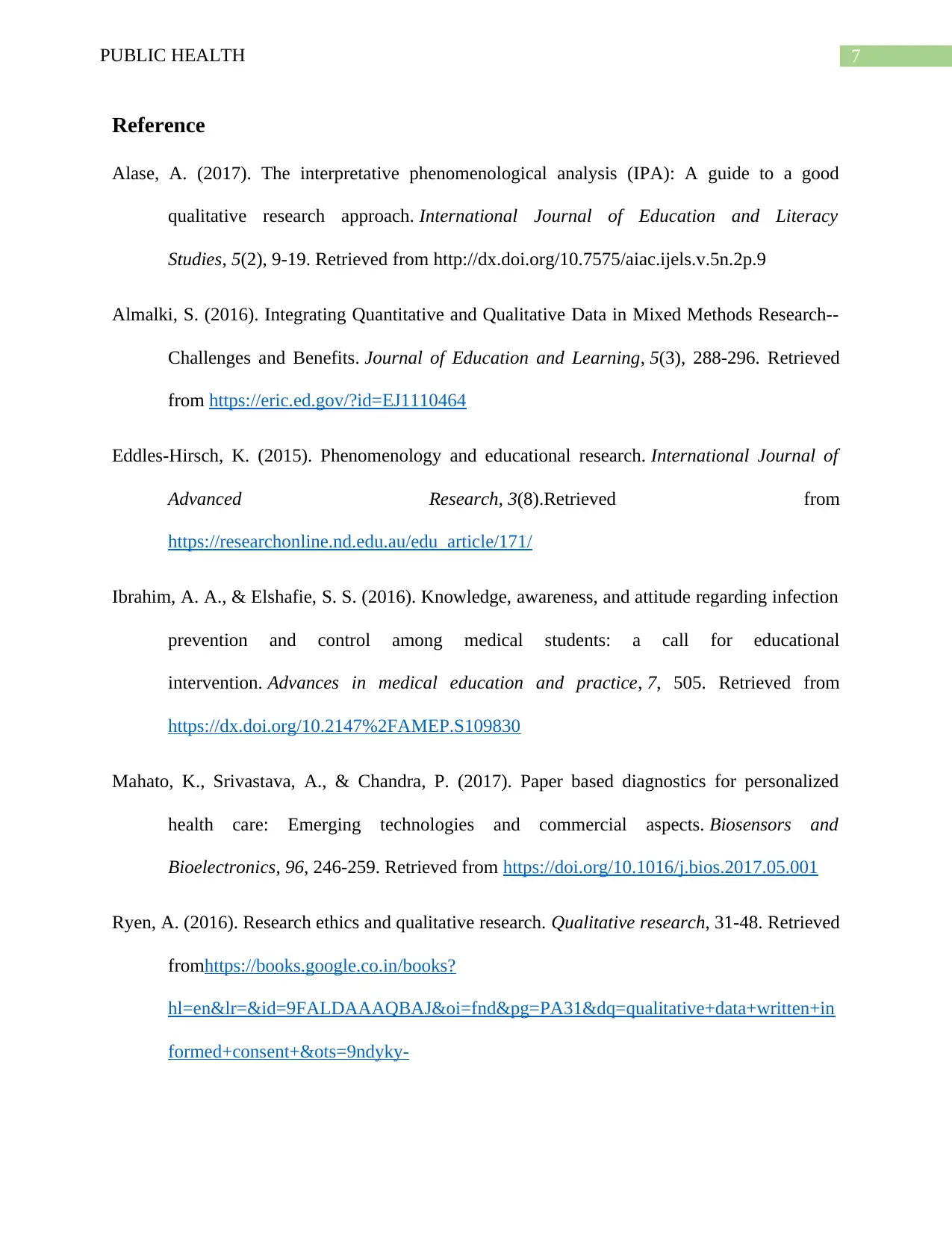
7PUBLIC HEALTH
Reference
Alase, A. (2017). The interpretative phenomenological analysis (IPA): A guide to a good
qualitative research approach. International Journal of Education and Literacy
Studies, 5(2), 9-19. Retrieved from http://dx.doi.org/10.7575/aiac.ijels.v.5n.2p.9
Almalki, S. (2016). Integrating Quantitative and Qualitative Data in Mixed Methods Research--
Challenges and Benefits. Journal of Education and Learning, 5(3), 288-296. Retrieved
from https://eric.ed.gov/?id=EJ1110464
Eddles-Hirsch, K. (2015). Phenomenology and educational research. International Journal of
Advanced Research, 3(8).Retrieved from
https://researchonline.nd.edu.au/edu_article/171/
Ibrahim, A. A., & Elshafie, S. S. (2016). Knowledge, awareness, and attitude regarding infection
prevention and control among medical students: a call for educational
intervention. Advances in medical education and practice, 7, 505. Retrieved from
https://dx.doi.org/10.2147%2FAMEP.S109830
Mahato, K., Srivastava, A., & Chandra, P. (2017). Paper based diagnostics for personalized
health care: Emerging technologies and commercial aspects. Biosensors and
Bioelectronics, 96, 246-259. Retrieved from https://doi.org/10.1016/j.bios.2017.05.001
Ryen, A. (2016). Research ethics and qualitative research. Qualitative research, 31-48. Retrieved
fromhttps://books.google.co.in/books?
hl=en&lr=&id=9FALDAAAQBAJ&oi=fnd&pg=PA31&dq=qualitative+data+written+in
formed+consent+&ots=9ndyky-
Reference
Alase, A. (2017). The interpretative phenomenological analysis (IPA): A guide to a good
qualitative research approach. International Journal of Education and Literacy
Studies, 5(2), 9-19. Retrieved from http://dx.doi.org/10.7575/aiac.ijels.v.5n.2p.9
Almalki, S. (2016). Integrating Quantitative and Qualitative Data in Mixed Methods Research--
Challenges and Benefits. Journal of Education and Learning, 5(3), 288-296. Retrieved
from https://eric.ed.gov/?id=EJ1110464
Eddles-Hirsch, K. (2015). Phenomenology and educational research. International Journal of
Advanced Research, 3(8).Retrieved from
https://researchonline.nd.edu.au/edu_article/171/
Ibrahim, A. A., & Elshafie, S. S. (2016). Knowledge, awareness, and attitude regarding infection
prevention and control among medical students: a call for educational
intervention. Advances in medical education and practice, 7, 505. Retrieved from
https://dx.doi.org/10.2147%2FAMEP.S109830
Mahato, K., Srivastava, A., & Chandra, P. (2017). Paper based diagnostics for personalized
health care: Emerging technologies and commercial aspects. Biosensors and
Bioelectronics, 96, 246-259. Retrieved from https://doi.org/10.1016/j.bios.2017.05.001
Ryen, A. (2016). Research ethics and qualitative research. Qualitative research, 31-48. Retrieved
fromhttps://books.google.co.in/books?
hl=en&lr=&id=9FALDAAAQBAJ&oi=fnd&pg=PA31&dq=qualitative+data+written+in
formed+consent+&ots=9ndyky-
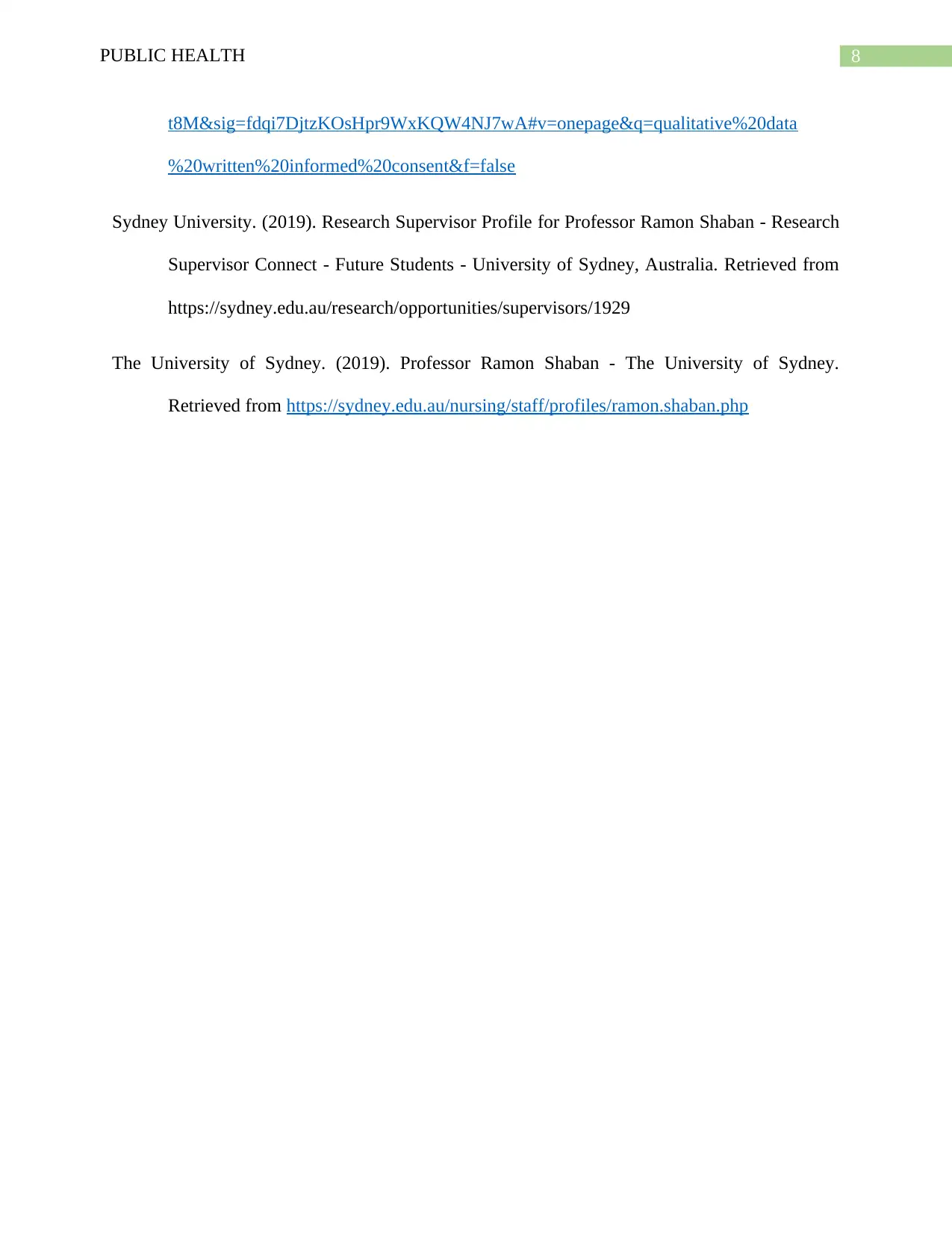
8PUBLIC HEALTH
t8M&sig=fdqi7DjtzKOsHpr9WxKQW4NJ7wA#v=onepage&q=qualitative%20data
%20written%20informed%20consent&f=false
Sydney University. (2019). Research Supervisor Profile for Professor Ramon Shaban - Research
Supervisor Connect - Future Students - University of Sydney, Australia. Retrieved from
https://sydney.edu.au/research/opportunities/supervisors/1929
The University of Sydney. (2019). Professor Ramon Shaban - The University of Sydney.
Retrieved from https://sydney.edu.au/nursing/staff/profiles/ramon.shaban.php
t8M&sig=fdqi7DjtzKOsHpr9WxKQW4NJ7wA#v=onepage&q=qualitative%20data
%20written%20informed%20consent&f=false
Sydney University. (2019). Research Supervisor Profile for Professor Ramon Shaban - Research
Supervisor Connect - Future Students - University of Sydney, Australia. Retrieved from
https://sydney.edu.au/research/opportunities/supervisors/1929
The University of Sydney. (2019). Professor Ramon Shaban - The University of Sydney.
Retrieved from https://sydney.edu.au/nursing/staff/profiles/ramon.shaban.php
⊘ This is a preview!⊘
Do you want full access?
Subscribe today to unlock all pages.

Trusted by 1+ million students worldwide
1 out of 9
Related Documents
Your All-in-One AI-Powered Toolkit for Academic Success.
+13062052269
info@desklib.com
Available 24*7 on WhatsApp / Email
![[object Object]](/_next/static/media/star-bottom.7253800d.svg)
Unlock your academic potential
Copyright © 2020–2026 A2Z Services. All Rights Reserved. Developed and managed by ZUCOL.





